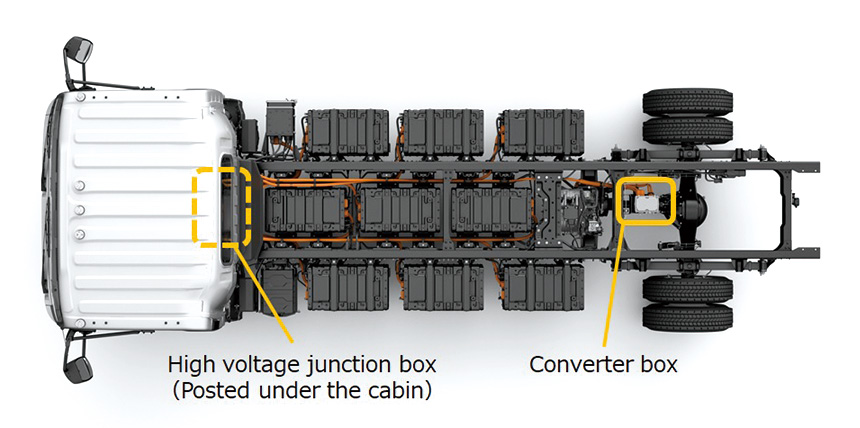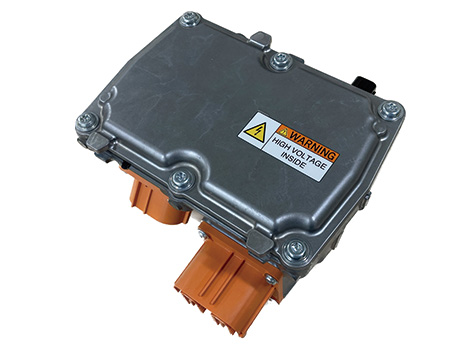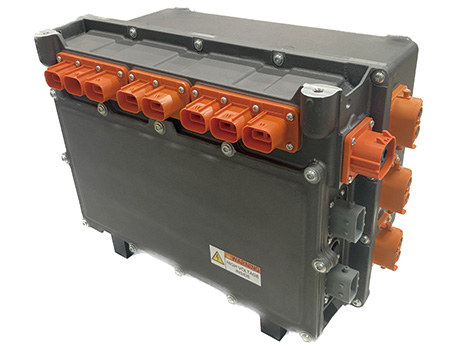Selected as high voltage junction box supplier for the Isuzu ELF EV
- Contributing to CO2 reduction through the development of products that support vehicle electrification -
- High voltage wire harness, converter box and high voltage junction box selected for use in the Isuzu ELF EV
- Prepared multiple lineups to respond to variable vehicle battery pack quantities
- Contributing to the promotion of EV and realization of carbon neutrality in 2050 through the development of environmentally friendly automotive products
Furukawa Automotive Systems Inc. (Headquarters: Inukami-gun, Shiga Prefecture; President: Shigenobu Abe), a member of Furukawa Electric Group, utilized its accumulated technology in the automobile electrical wiring product business to realize a smaller converter box and high voltage junction box and started deliveries of these products for the ELF EV, a BEV (note 1) truck manufactured by Isuzu Motors Ltd. (Head office: Yokohama, Kanagawa Prefecture; President and COO: Shinsuke Minami; hereinafter “ISUZU”).
Background
Global warming due to increased emissions of CO2 and other greenhouse gases is causing a wide range of abnormal weather events, and it is a major environmental problem worldwide. To solve this problem, the Japanese government declared the goal of achieving carbon neutrality in 2050 and set forth a “green growth strategy following the shift to carbon neutrality”. For the automotive industry, EV targets have been set for small commercial vehicles at 20-30% of new vehicle sales by 2030 with the aim of achieving 100% EV/zero emission new vehicle sales by 2040. For large commercial vehicles, the targets have been set at introducing 5,000 vehicles during the 2020s followed by setting more definite targets for 2040 by 2030. Going forward, the use of EV is expected to accelerate. Within this trend, ISUZU launched the ELF EV, its first mass produced BEV, in July of this year, and this truck is expected to contribute to the practical use of commercial BEV in society and achievement of carbon neutrality.
Details
The ISUZU ELF has undergone its first full model change in 17 years, and a new EV model has been added to the lineup. For this EV, Furukawa Automotive Systems developed a converter box (note 2) in addition to the company’s existing low voltage wire harnesses and high voltage wire harnesses and started mass production and deliveries beginning from July of this year. Also, a high voltage junction box was developed for the ISUZU N-Series EV announced in North America in March of this year, and it is planned to commence mass production from the first half of 2024. When the truck is moving, the newly developed high voltage junction box optimally distributes the electrical power from the battery pack (note 3) to the inverter (note 4) and auxiliary equipment such as the heater and air compressor, and it also optimally distributes the electric power from the charger to the battery pack when recharging. In addition, it is equipped with a high voltage fuse for overcurrent protection of the in-vehicle auxiliary equipment, as well as a battery control unit (note 5) and current sensor that detect the battery state, and an interlock circuit (note 6) has been set up to prevent electrocution with high voltages. A lineup of four high voltage junction box models that support different numbers of battery packs (3, 5, 7, 9 packs depending on the required driving distance) has been prepared to flexibly respond to the diverse needs of customers.
Features of the high voltage junction box
1: Achieved a smaller design that still considers the heat generated by the use of higher currents
In response to the heat generated by components when powered at high currents, the status of heat generation was visualized through the use of thermal simulations, and the internal components were optimally arranged to satisfy the thermal requirements. Also, for the internal circuitry, a structure that uses a harness for connecting the electrical wires was adopted in addition to the busbar (note 7), and the optimum powered state was selected based on our technology accumulated over the years through the development of wire harnesses. As a result, compared to the company’s existing products that generate the same or less heat, the loading ratio of the internal components was improved by 20% (realized smaller size).
2: Prepared a wide lineup that can respond to different battery pack quantities
In order to respond to variation in battery pack setups based on the user’s required driving distance, a lineup of four high voltage junction box models was set. Through the adoption of common components and a different processing method for the metal case, efforts were made to reduce costs by using the same die casting dies for different models, as well as to flexibly respond to customer requirements.
3: Revised the manufacturing method, and contributing to achieving carbon neutrality
The die casting method used to manufacture the metal case has been changed from the traditional melting of aluminum ingots to receiving molten aluminum directly from the smelter. Compared to melting aluminum ingots, this new manufacturing method reduces CO2 emissions by about 40%.
Furukawa Electric Group will continue to contribute to the promotion of EV and achievement of carbon neutrality in 2050 through product development.

(note 1)BEV: Battery Electric Vehicle. Electric vehicle powered by batteries
(note 2)Converter box: Electrical connection box that connects the wires used to transmit power to the drive motor
(note 3)Battery pack: A singular package that houses multiple lithium-ion batteries used to power the EV
(note 4)Inverter: Device that converts the direct current from the batteries to alternating current used by the drive motor, and it also controls the motor revolutions and torque by adjusting the frequency and voltage of the alternating current
(note 5)Battery control unit: Unit that controls the charging and discharging of the lithium ion batteries used to power the EV
(note 6)Interlock circuit: With consideration for ensuring the safety of the maintenance workers due to the high voltages of several hundred volts in the powered state, when the connector is connected or disconnected, the data is sent to the control unit as a signal, and the power supply is interrupted. The interlock circuit is responsible for transmitting this signal.
(note 7)Busbar: Conductor component for transmitting large electrical currents. Busbars are primarily made of copper and formed to the desired shape by punching and bending copper strips through press forming.
Furukawa Electric Group’s efforts towards the SDGs
Based on the “Sustainable Development Goals (SDGs)” adopted by the United Nations, Furukawa Electric Group has formulated the “Furukawa Electric Group Vision 2030” which sets the year 2030 as its target and is advancing efforts with the aim to “Build a sustainable world and make people’s life safe, peaceful and rewarding, Furukawa Electric Group will create solutions for the new generation of global infrastructure combining information, energy and mobility.” Toward the achievement of our Vision 2030, we will take open, agile, and innovative approaches to promote ESG management that aims to increase corporate value over the medium to long term and will contribute to the achievement of the SDGs.









 Share
Share Tweet
Tweet Share
Share